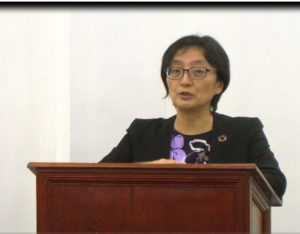 …EU urges respect for Constitution, business community says Court’s decision must be respected
…EU urges respect for Constitution, business community says Court’s decision must be respected
Local and international pressure continues to mount on Government, as President David Granger is yet to announce a date for early elections.
This time, both the European Union (EU) and the Private Sector Commission (PSC) are warning of the need for constitutional compliance.
In a statement on Monday, the EU’s local mission revealed that it was keeping an eye on developments following the vote. The EU urged that democratic procedures and the rule of law be respected and upheld.
The EU also called for free and fair elections to be held and for the Guyana Government to follow all requirements outlined in the Constitution of Guyana following the December 21, 2018 no-confidence vote.
Since acting Chief Justice Roxane George upheld the no-confidence vote on January 31, Government has said it will appeal. According to the EU, it is best if these appeals are expedited, hinting that foreign investments into Guyana are being held up by the political uncertainty.
“The Delegation of the European Union calls on all concerned bodies and stakeholders to uphold the Constitution, respecting democratic procedures and the rule of law. Procedures should be managed efficiently, with openness and transparency.
“In this regard, the Delegation of the European Union hopes that the further legal process can be expedited, for the benefit of Guyana, its people and its development, in view of pending Foreign Direct Investments.”
The EU also lauded the High Court, which fast-tracked the no-confidence cases to ensure a ruling by January month end. The statement also expressed expectations for free and fair elections being held in line with the Constitution of Guyana.
Article 106 of the Constitution says that elections must be held within three months after a no-confidence vote is passed. Such a vote was passed on December 21, 2018, but since then there has been uncertainty about the Guyana Elections Commission’s readiness.
Government has since said it is not resigning until its efforts to overturn the no-confidence vote are adjudicated at the level of the Caribbean Court of Justice (CCJ).
It was only a few days ago that United Nations Resident Coordinator Mikiko Tanaka also urged Government to respect the Constitution of Guyana. Guyana’s PSC had also previously called for GECOM to open up about its readiness for elections.
PSC
As uncertainty continues to swirl over when elections will actually be held, the PSC in a strongly worded statement on Monday said it was growing increasingly concerned over the Government’s insistence on business as usual while it appeals the no-confidence cases it lost.
According to the PSC, these statements being made by the Government and its representatives are a matter of concern since the High Court has already refused Government’s request for a stay of judgment.
“The statement issued by the Government’s Department of Public Information clearly and, it appears, with deliberate intent, flies in the face of the decision of the Chief Justice. The ‘status quo’, meaning that nothing has changed, simply does not remain and the business of Government does not continue ‘as usual’. There have since been similar misleading statements made by senior members of the governing party, which add to the Commission’s concern,” the PSC stated.
“We must underline the fact that when the Attorney General sought a conservatory order from the Chief Justice to preserve the ‘status quo ante’, his application was rejected … Clearly, therefore, in the view of the Commission, her ruling remains in place unless successfully appealed in a superior court. The Commission, as a consequence, expects the President and his Government to respect and honour the decision of the Chief Justice.”
In this vein, the PSC made it clear that Government must ensure elections are held no later than March 21, 2019 as required by Article 106 (7) of the Constitution of Guyana. It also reminded that the Chief Justice in her decision upheld Article 106 (6) and (7) of the Constitution, which state that the Government, while remaining in office with the President in place, does so without a functioning Cabinet.
“The Private Sector Commission speaks not only for the business community with hundreds of billions invested in the development of our economy and the employment of some 60 per cent of our workforce. In this case, we believe that we speak for the majority of the nation when we express our concern over public statements which deny the express ruling of the Chief Justice, statements which could lead our country into a situation of grave instability and an illegal government resulting,” the PSC said.
In addition, the Commission threw its support behind both the EU and the UN for throwing their weight behind calls for the Constitution of Guyana to be respected, the rule of law upheld and for free and fair elections.
Government fell to the no-confidence vote on December 21 last year. Article 106 (6) of the Constitution of Guyana states: “The Cabinet including the President shall resign if the Government is defeated by the vote of a majority of all the elected members of the National Assembly on a vote of confidence.”
Meanwhile, 106 (7) goes on to state that, “Notwithstanding its defeat, the Government shall remain in office and shall hold an election within three months, or such longer period as the National Assembly shall by resolution supported by not less than two-thirds of the votes of all the elected members of the National Assembly determine, and shall resign after the President takes the oath of office following the election.”
Both the National Assembly and the High Court have refused Government’s attempts and arguments to overturn the no-confidence vote. Despite this, however, President Granger is yet to indicate a date for elections. GECOM successfully ran the Local Government Elections (LGE) in November 2018, less than three months ago.
It is the President of Guyana, who has to give a date for elections and not GECOM as being touted. The President of Guyana, according to the Constitution, has to dissolve Parliament and issue a date for elections.



